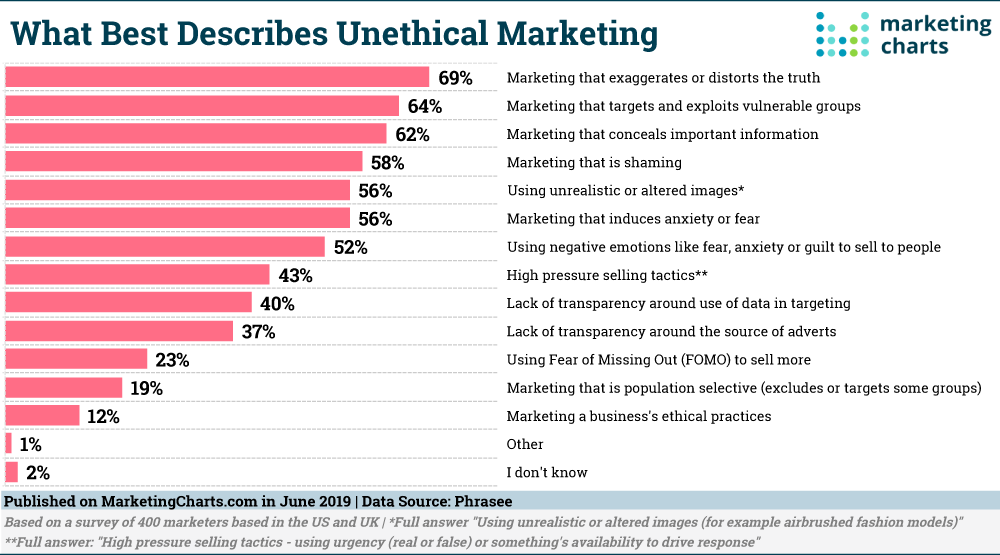Companies today have access to pretty much all the data they need. With customer insights tools and systems, the potential to improve your business through market research is limitless. Your success depends on collecting and utilising this information in an ethical way. In this article, I will introduce you to effective strategies for ethical marketing research.
Ethics is a framework through which you should view all business decisions. In market research, it can make the difference between effective long-term brand decisions and ultimately destructive marketing.
94% of consumers say they are likely to remain loyal to a brand that offers complete transparency. Unethical practices – such as hiding how you use data – affect your ability to retain customers and grow as a business. Instead, learn how to collect and use market research data in an ethical way to find a better approach.
(Un)ethical data practices affect your business – the consequences
The role of ethics in market research goes beyond simply doing the right thing. Even though this is crucial when collecting market data. Visitors use your website with the assumption that they will not be exploited in any way. By adhering to ethical business practices, you can ensure this doesn’t happen and create a rift between you and your target audience that you may never recover from.
In a notorious case, Facebook was found to have breached data protection laws when it allowed Cambridge Analytica to collect the data of 87 million users. The consequences were a £500,000 fine from the U.K. Information Commissioner’s Office and a worldwide denigration of the brand name. After the scandal came to light, likes, shares and posts on the social media platform fell by 20%.
This is one reason that Facebook is undoubtedly still trying to overcome. The scandal shows how the lack of clear ethical principles can affect the perception and engagement of an online audience, which in turn affects revenue and customer loyalty.
When conducting market research, it also helps to understand which practices consumers consider unethical. Here are a few examples:

Unethical marketing includes, among other things …
- Marketing that exaggerates or distorts the truth
- Marketing that targets and exploits vulnerable groups
- Marketing that hides important information
- Marketing that includes shaming
- Marketing that uses unrealistic or altered images
The best way to avoid these circumstances is to put ethics at the centre of the research process. But what ethical principles can guide you in market research?
Ethical principles in market research

Any business model that relies on online data – in other words, just about every company in the modern age – must take the perspective of its target group into account. Otherwise, you run the risk of alienating (and alienating) your consumers. Ethical market research principles will help you avoid these damaging circumstances.
These are the ethical principles that you should observe when conducting market research:
Transparency
Transparency is the first principle of data collection required by certain legal provisions such as the EU General Data Protection Regulation (GDPR). Transparency means that you explicitly explain to users what data you collect and how you use it. Transparency is important to raise expectations and create a contract of trust with your audience. This allows your users to feel confident that they can adhere to your policies and develop greater loyalty through trust.
Data protection
Ethical market research must also ensure that the data collected remains private. When Equifax failed to update its systems , the company exposed 148 million customers worldwide to a data breach. Theft and identity fraud were the result of this seized information and shook users’ confidence in the platform. Data protection is what we all expect when we interact with a company online. This also applies to market research, which serves as the basis for business practices.
Purpose
To be ethical, data collection must also be targeted. This means that the information collected must be in line with actual business objectives. Companies may be tempted to collect as much data as possible in the course of their research, but all this data exposes users to violations. For an ethical approach, research metrics should be defined in advance and their applications explicitly specified.
Compliance
Then, ethical market research depends on a company adhering to the policies and data applications it has communicated internally and externally. When collecting personal data from your users, it can be tempting to sell this information to other companies, but depending on the jurisdiction, this may violate both the trust of your target audience and privacy regulations. Stick to your guidelines to conduct ethical research.
Minimisation
Similar to purpose, this principle of ethical market research ensures that you limit the data collected. This includes destroying the data within a reasonable period of time and minimising identifying information as much as possible.
In this way, companies can not only protect the personal data of their users, but also minimise the paralysis caused by big data analyses. This helps companies both to handle data ethically and to make efficient marketing decisions.
These principles are the foundation for the ethical collection of market research data in all its forms. No matter how you collect data – through social media insights, A/B testing or focus groups – your approach should start with these considerations. Learn how to collect data ethically here.
Subscribe to the Raidboxes newsletter!
We share the latest WordPress insights, business tips, and more with you once a month.
"*" indicates required fields
How to conduct ethical market research
The budget and operational requirements of each business model will dictate its approach to market research. However, ethical considerations can be applied to any approach to data collection. The first step is to prioritise ethics when determining your market research strategy and tactics. The strategy represents an overarching goal. The tactic is the means you use to achieve that goal.
If you want to collect market research data ethically, you need to align your strategy with these ethical principles. Then use tactics like the following:
Establish clear terms of use and privacy policies.
Ethical research and data collection starts with the terms you present to your audience. These are your terms of use, privacy policy and cookie banners that visitors see when they first interact with your platform and submit data.
Social selling of any kind depends on the trust that is built through this transparency. Regardless of how you collect data for marketing purposes, it is essential for an ethical approach to explain exactly what data you collect and how you use it.

Capture data that represents your diverse audience.
Ethics require you to represent all your users. This means you need to ensure that your market research reaches all the people you serve. To ensure this, you should diversify your data collection across different platforms. Utilise social media insights as well as search engine data and more traditional forms of outreach. Diverse teams have been shown to increase profits by up to 7% for some organisations. So don’t miss out on this integrative aspect of market research.
Give participants the right to withdraw at any time.
Ethical market research means that you respect the rights of your audience. One of these rights is the right to opt out at any time. Allow your participants to opt out of data collection, delete their account and download what you have saved in their profile. This helps to build trust in your platform.
Check whether you are biased in your research.
Unconscious bias and cognitive bias (also known as bias) are a real problem when you’re conducting market research. Fortunately, you can do something about it – if you know what to look out for. Check your data for anything that might perpetuate stereotypes. And invite different team members to challenge your research process.
If you use artificial intelligence, make sure that it has been tested against the biases that go into the programming.
Prioritise the protection of data.
If you collect research data – for example through social media monitoring and other digital processes – you need a system to protect that data. In both the Facebook case and the Equifax case, unethical practices were the result of the data not being protected. Both cases resulted in significant losses for the companies involved. Keep your data systems up to date and protected with firewalls and cybersecurity best practices.

Cybersecurity and data protection is a top priority. (Image source: Open.AC.UK)
With these tactics, maintaining an ethical market research approach becomes a simple process. You can build a trustworthy digital presence that avoids the pitfalls of careless data collection.
Better business through ethical market research
The digital market is becoming increasingly competitive. This is not the only reason why it is more important than ever to build an ethical business model. Ethical marketing research is your tool to achieve this, but it must focus on ethical principles to be successful.
Start the market research process with a commitment to transparency, privacy, minimisation and the other principles outlined here. Then use these tactics to avoid unethical practices and base better marketing on an ethical approach. Better business awaits you in the form of loyal customers, more trust and more marketing relevance.
Your questions about ethical marketing research
We look forward to your comments and questions. For more insights on online marketing and WordPress, follow Raidboxes on Facebook or LinkedIn – or subscribe to our newsletter.

Leave a Reply